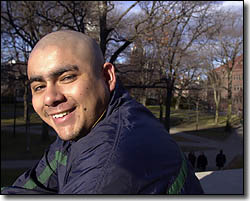Cultural Transplant — Sophomore Jesus Aleman moves between two worlds

When he was 5 years old, Jesus Aleman 02 began working in the fields with his family in northern Mexico. He picked cotton and helped grow watermelons, and he learned that separation can ensure survival.
“When two plants grow too close together, theyll both grow really short. But if you have one plant here, and another over there in a separate little pot, they grow a lot taller than they would have if you had both in the same pot,” he says.
Aleman immigrated to the United States when he was 8. He returned to Mexico three years later, and then immigrated again when he was 15. He has grown taller in this new plot of land. But hes also a product of his home soil. Reconciling these two parts of himself, and moving between these two worlds Mexico and the United States has been difficult for him.
“I think of myself as Mexican. If someone gave me the choice, Where do you want to be? Ill take you there without you knowing that the other place ever existed, Id probably say Mexico,” he says. “But the thing is, knowing that these two places exist, you have to learn to exist outside the bounds of both, and try to live in both as much as you can.”
Ceceda and L.A.
Aleman grew up in Ceceda, a town maybe five blocks by three blocks large, with a two lane road running down one side of it. Everybody knew everybody in Ceceda, he says, and one thing they knew was that Aleman was different from the other kids.
He read books as well as rode horses. He was the smart kid as well as the kid who played soccer on the dusty, grassless soccer field.
In 1989, Aleman and his mother, a schoolteacher, moved to East Los Angeles, where Alemans grandmother lived, in search of a better education for Aleman.
They lived in a federal housing project ruled by gangs. Aleman was locked in every night for his own safety.
“I lived in fear,” Aleman says. He learned to read peoples hands for concealed weapons and to disappear when members of rival gangs showed up in the same classes.
He scored high enough on I.Q. tests to place into a selective school for gifted students.
But the stresses of surviving in the projects, the pain of seeing his mother demoralized by her job selling shoes, and the academic challenges of his new school made him miserable.
He had also developed a block about speaking English. “I think subconsciously I was holding myself back,” he says. “Even though I knew how to speak English, I would refuse to say things.”
He cared about learninghed mutter the right answers to other students when teachers asked questions in classbut he couldnt speak up for himself in his new language.
When he was 10, he and his mother returned to Mexico.
Back in Ceceda
Immigrating, Aleman says, gives you double vision. He could no longer look at Ceceda without seeing it in comparison with America.
The hard work of farming, for so little profit, no longer made sense to him.
“Even though I couldnt verbalize it, I think there must have been elements of me saying to myself, This is not right. Why do these people always have to do this one thing over and over? And things dont change. I dont see my uncle having a better truck this year than he did a few years ago.”
He refused to work in the fields anymore, which upset his family. The alternatives didnt tempt him either. Ceceda, like much of Mexico, was undergoing a major shift from agriculture to manufacturing. Increased foreign investment a by-product of the North American Free Trade Agreement (NAFTA) brought the first sweatshops into Alemans municipality in the early 1990s.
Land reform legislation in the 90s also empowered Mexicans to sell or lease land that previously had been communally owned. More and more people were leaving Ceceda for more lucrative jobs in the cities. Aleman estimates that roughly half the adobe houses in Ceceda are deserted now.
Aleman was bored in his classes and, increasingly, getting into trouble. He realized he would have three choices after junior high. To work in the fields. To work in the factories. To go to a not very good high school, where he would continue to be bored.
The first time he went to America, he was a child caught in someone elses plan for him. This time was different.
He wanted to learn. “And that was how I saw it: If I want to learn more things, I actually have to leave this place.”
Back to L.A.
Returning to America was painful for him. He moved back to his grandmothers housing project in Los Angeles and enrolled in a high school 17 times larger than his entire hometown.
He kept telling himself he would go back to Mexico immediately after high school. He ran every day so that hed be in good shape to play soccer when he returned. He wrote lots of letters home.
And again, almost in spite of himself, he wouldnt speak English.
“I felt like speaking English was a betrayal of my own identity. I strove to not speak English. I went the entire first year without ever telling somebody something more significant than, heres my homework.”
Perhaps as a sign of his unhappiness, he stopped speaking in Spanish, too. “I made a conscious decision that I wouldnt tell people about my problems. That I wouldnt let anyone mess with my inner feelings. Even my grandmother, who I was living with, it was just like hello, how are you, wheres my food,” he says wryly. “Coming back was very painful, and I just opted to deal with it by closing myself off.”
His mental block about speaking grew so intense, he says, that one time in class, “I was crying because I couldnt do it. I had something to say, and I just couldnt say it.”
In time, his boycott lifted.
“It was incredibly difficult to keep up with it, you know? How do I go about living in this place without speaking English? And see, thats just representative of the entire inner processhow do I go about living in this society without doing the things this society does?”
Hes still struggling with this question at Harvard. “How do I take the good stuff of being a part of this great university without contributing to those things that make my place back home worse off?”
Harvard
Aleman faces dilemmas at Harvard different from those of most of his classmates.
For instance, one of the factories near his hometown makes Champion and Russell sweatshirts.
“I go back home, and my friends are employed there, and theyre making roughly 100, 150 sweaters per week, each person. And they get paid about $30 per week, per person. And then I come over here, and all my friends are probably going to be, at some point, the future employers of these people, indirectly of course, and perhaps without even knowing it.”
“So I want to have some university spirit and go support the Harvard-Yale game, right?” he says. “Do I go and buy a sweater?” This fall he struggled with this question, and ultimately decided not to buy the sweater.
“You have this trade-off that you face,” he says. “You want to take the good parts of this new culture, and you want to keep the good parts of your old culture. But its really hard to determine whats good and whats bad, in most cases that matter. For example, its very easy to say, its not a great idea to be a macho and beat females, it just doesnt make sense, right? But its not so clear-cut what the best thing is to do, to buy the sweater or not to buy the sweater. And ultimately, the people back home need something to work on, they need jobs, or theyre not going to eat.”
For Aleman, adjusting to a new culture can be a matter of exchange: wearing the black polo shirt, not the colorful shirt with the horses on it; walking across the Yard in a down jacket, not the poncho he would wear in Mexico. It can be a question of degree, too: drinking less than he might in Mexico; running more, because jogging isnt seen as aberrant here. But the most difficult moments are the “sweatshirt” moments, when choosing the ways of one culture feels like a betrayal of the other, not just a neutral exchange or a change in degree.
His quandary as an immigrant the fact that he sees two cultures in relation to each other has shaped his time at Harvard and his plans for the future.
Aleman came to Harvard to study physics. But every time he went home he couldnt square what he was learning at school with the realities his townsfolk were dealing with.
Now he concentrates in economics. He is consciously training himself for a future where he can make a difference in places like Ceceda. And hes not shy about speaking English now.
“I want to change the world,” he says. “For example, every day, I walk back to the Quad, and theres a statue in the park that says, Never again should a people starve in a world of plenty.’ And then I go home and I eat, and sometimes I waste food. And then I walk back, and theres a bank, and theres people going in to the bank. And theres always a homeless person standing outside the bank begging.”
“I think were doing something really, really wrong,” he says. “I dont know everything, I cant say what it is, but I think there has to be a way to do things so that these things dont take place.”
Hes begun changing the world with a group at Harvard called the Cyber-Forum for International Development. This group aims to mobilize student development organizations around the globe. By coordinating these groups efforts, via online forums, conferences, and a development review magazine, Aleman and his partners hope to create a greater impact than if each group acted independently.
And as a one-person forum, of sorts, as someone who moves between two worlds, he is acutely aware of his responsibility to people back home.
“The typical person that immigrates from my town to the United States, they go to Arizona or Texas, they get a job, they save like crazy for the six months that theyre here, and they go back to Mexico with, like, three or four thousand dollars. And they come back wearing fancy clothes, a nice hat, boots, and a pretty OK car, so people have this weird misconception. And that image cost a lot when I was growing up. A lot of people came here and bad things happened, because its not that easy.”
“I try as much as possible not to portray any image of what the U.S. is like. My personal responsibility to the people back home is, if they ask me, to tell them about my experience, speaking from my experience, as far as that goes.”
His status back home is changing, which gives him mixed feelings. His elders ask him for advice now, something he finds gratifying as well as uncomfortable. Several past presidents of Mexico spent time at Harvard, a fact thats not lost on his community.
Aleman has put a quote at the end of all his e-mail messages. “Es tanta mi fe, que aunque no tengo jardin, ya compre una podadora.” Its a lyric from the pop singer Ricardo Arjona: My faith is such that, even though I dont have a garden yet, I have bought a mower.
“If at some point I go on this massive campaign to change the world, chances are Im going to be a little better equipped if I stay here and try to absorb as much as I can from this society Im in right now,” he says. “It will be a more complete experience.”




